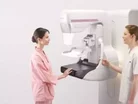FUJIFILM, Toshiba Introduce Advanced Technology In Women's Health

Standing beside the United States and Europe, Japan ranks lowest when it comes to the consultation rate of breast cancer screening (20-30%), according to Asian News International. As the second leading cause of cancer death in women worldwide, the future in finding a cure is in detection at the earliest stage possible.
With half of the world’s population residing in Asia, cardiovascular disease prevention is also an important issue for Japanese and world health.
Two companies based in Japan, FUJIFILM Holdings Corporation and Toshiba Medical Systems Corporation, are aiming to raise the quality of health not only in their home country but around the globe, as well.
FUJIFILM announced on Wednesday, July 9, 510(k) clearance for their Aspire Cristalle breast imaging solution from the U.S. Food and Drug Administration (FDA). The Aspire Cristalle combines innovative detector engineering and patient-focused ergonomics for faster and more accurate diagnostics and improved patient comfort.
In a recent release issued by FUJIFILM, Rob Fazio, director of marketing and product development, stated, “Aspire Cristalle nicely represents our latest culmination of imaging innovation and attention to every detail in design.”
“The Aspire Cristalle will deliver brilliant images with gentle dose, while redefining the patient experience through a notably more comfortable exam,” Fazio added.
The digital mammography system, which features an innovative detector hexagonal pixel design and a padded comfort paddle, is another method in improving the rate of detection of breast cancer.
With the recent introduction of an advanced X-ray system, hospitals are now able to address cardiology needs thanks to Toshiba’s Infinix Essential.
Featuring C-arm design and WorkRite technology, the system allows for unprecedented access and coverage during interventional cardiac procedures.
“Toshiba’s entire Infinix product line is designed to provide our customers with the right technology for better patient care and the new business environment,” said David Sloop, director of X-ray Vascular Business Unit, Toshiba.
In addition to the recent launch, existing systems are being repositioned to meet the needs of providers during healthcare reform.
With the expansion of techniques and medical devices on the rise, Japanese manufacturers continue to remain on the cusp providing the world market with advanced technology.
